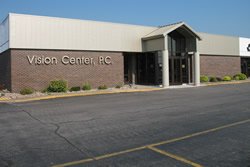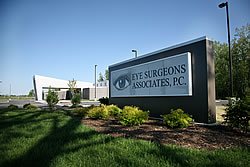ThucAnh Multerer, MD

An estimated 2.2 million Americans suffer from advanced stages of age-related macular degeneration, which will double by 2032. Wet age-related macular degeneration (AMD) occurs when disruption in the area of the eye serving central vision, the macula, causes patients to develop new vessels (choroidal neovascularization) that bleed and leak fluid into the eye. Although you can lose central vision from dry AMD, most vision loss occurs in patients with the wet form. If your eye doctor detects sufficient disruption in the macula, Age-Related Eye Disease Study (AREDS II) vitamins may be beneficial. Taken daily, over-the-counter vitamin can decrease the risk of developing wet AMD by 25%.
Patients at risk for developing wet AMD have the best chance of successfully maintaining vision by regularly using an Amsler grid. You can use this painless testing tool daily at home. If you notice areas on the chart that appear darker, wavy, blank or blurry, contact your eye doctor immediately. The key to preserving your vision is to see your eye doctor early to begin treatment.
Treatment for AMD was suboptimal prior to the start of my retina career, as even with the best treatment, patients continued to lose most of their central vision. In 2005, a class of medications called anti-vascular endothelial growth factors (anti-VEGF) revolutionized the treatment of wet AMD. With anti-VEGF treatments, patients have a 95% chance of keeping the vision they have at the start of treatment and up to a 35% chance of regaining some of the lost vision. Anti-VEGF agents currently available are Avastin® (bevacizumab), EYLEA® (aflibercept), Lucentis® (Ranibizumab), BEOVU® (brolucizumab-dbll).
Some patients may be concerned that Avastin is not FDA approved. While Eylea, Lucentis, and Beovu are FDA approved for the treatment of wet AMD, this approval was based on studies performed on 1,100 to 2,400 patients treated for a year or less. Avastin has been used on millions of patients over a 16-year period with great success. Additionally, the National Institutes of Health conducted a study that confirmed Avastin’s effectiveness. Consequently, Avastin has earned its place as part of the standard of care for the management of AMD.
With a 16-year history as a safe and effective treatment for AMD, Anti-VEGF agents may slightly increase the risk of stroke and heart attack. For the vast majority of patients, the vision benefits typically outweigh these risks. However, caution is encouraged in patients with a history of recent stroke or heart attack. Additionally, contraception is recommended for women of child-bearing age due to the potential risk of fetal harm.
Although treatment for wet AMD is highly effective, receiving injections up to every four weeks can be a burden for patients who often require a driver for each visit. Recent approval of two additional agents, Vabysmo® and, Susvimo ®, help alleviate this burden. With the FDA approval of Vabysmo® (faricimab-svoa), patients receive treatment at four-week intervals for the first four doses, and then every 8, 12 or 16 weeks. The study showed that 80% of patients were able to have their treatment extended to every 12 weeks. Susvimo ® (ranibizumab) allows treatment to be extended to six months, but it does require a surgical procedure to place the implant to provide a continuous release of the anti-VEGF medication.
There is even more hope for those with this chronic condition, as there are other treatments on the horizon. I spent a year performing gene therapy research with Jean Bennett at the University of Pennsylvania. Bennett’s work led to the FDA approval of the first gene therapy in the United States, specifically for a retina condition called Leber Congenital Amaurosis. This research in making gene therapy is another possible option for the management of macular degeneration in the not-so-distant future.
ThucAnh Multerer, with Eye Surgeons Associates, is a board –certified, fellowship-trained retina surgeon. She sees patients in our Bettendorf clinic. For more information visit www.esaeyecare.com .
The material contained in this article is for informational purposes only and is not intended to be a substitute for professional medical advice, diagnosis, or treatment. Always seek the advice of your physician or other qualified health care provider.




